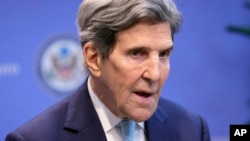U.S. climate envoy John Kerry arrived in China on Sunday, state media reported, to restart stalled talks between the world's two biggest emitters of planet-warming gases.
Starting on Monday, "China and the United States will have an in-depth exchange of views" on climate issues, state broadcaster CCTV said on Kerry's arrival in Beijing.
Kerry's trip to China, where he will meet with his counterpart Xie Zhenhua, follows weeks of record-setting summer heat that scientists say is being exacerbated by climate change.
Bilateral climate talks stalled last year after Nancy Pelosi, then speaker of the U.S. House of Representatives, visited self-ruled Taiwan and infuriated Beijing, which considers the island its territory.
But Kerry, a former secretary of state, has enjoyed comparatively cordial and consistent relations with China despite Washington and Beijing locking horns over Taiwan and a number of other thorny issues, including advanced semiconductors.
His trip to Beijing is his third as President Joe Biden's climate emissary and also comes after two other high-profile visits by US officials -- first Secretary of State Antony Blinken, then Treasury Secretary Janet Yellen -- aimed at stabilizing U.S.-China ties.
The Biden administration has identified climate as an area for potential cooperation with Beijing, despite the tensions elsewhere.
The restart of U.S.-China climate talks will come on the heels of the hottest week on record globally, according to the World Meteorological Organization.
June was already the hottest ever logged, according to U.S. and European agencies.
Kerry will aim to use his time in Beijing to engage with Chinese officials "with respect to increasing implementation and ambition and promoting a successful COP28", the State Department said, referring to the UN climate talks in November.
Nearly 200 nations will gather in the United Arab Emirates for COP28 to thrash out ways to mitigate global warming and its impacts.
Energy constraints
As the leading producer of the greenhouse gases driving climate change, China has pledged to peak carbon emissions by 2030 and achieve complete carbon neutrality by 2060.
President Xi Jinping has also said that the country will reduce its use of coal from 2026.
But in April, China approved a major surge in coal power -- a move Greenpeace said prioritised energy supply over the emissions reduction pledge -- fueling concerns that Beijing will struggle to meet its ambitious targets.
"There are a number of factors that constrain the hands of energy planners in Beijing at the moment," Byford Tsang, a senior policy adviser at the climate-focused think tank E3G, told AFP.
They include economic fallout from Russia's invasion of Ukraine, which has led to major disruptions in the global gas market, and reduced hydropower capacity in China due to severe droughts in recent years, Tsang said.
Last summer, millions of people in southwest China faced rolling power cuts after crushing heatwaves led to an electricity supply crunch that forced factories to halt work, heightening domestic concerns over energy security.
"I think it would be politically challenging for China to take a step forward on coal policy at this stage," added Tsang.
During his visit, Kerry is also expected to bring up international climate finance efforts, following calls by Yellen during her Beijing trip for China to play a larger role.
Kerry's trip will be closely watched in Washington after Republican lawmakers characterized it as him flying a carbon-spewing private jet halfway across the world to discuss climate with a political adversary.




